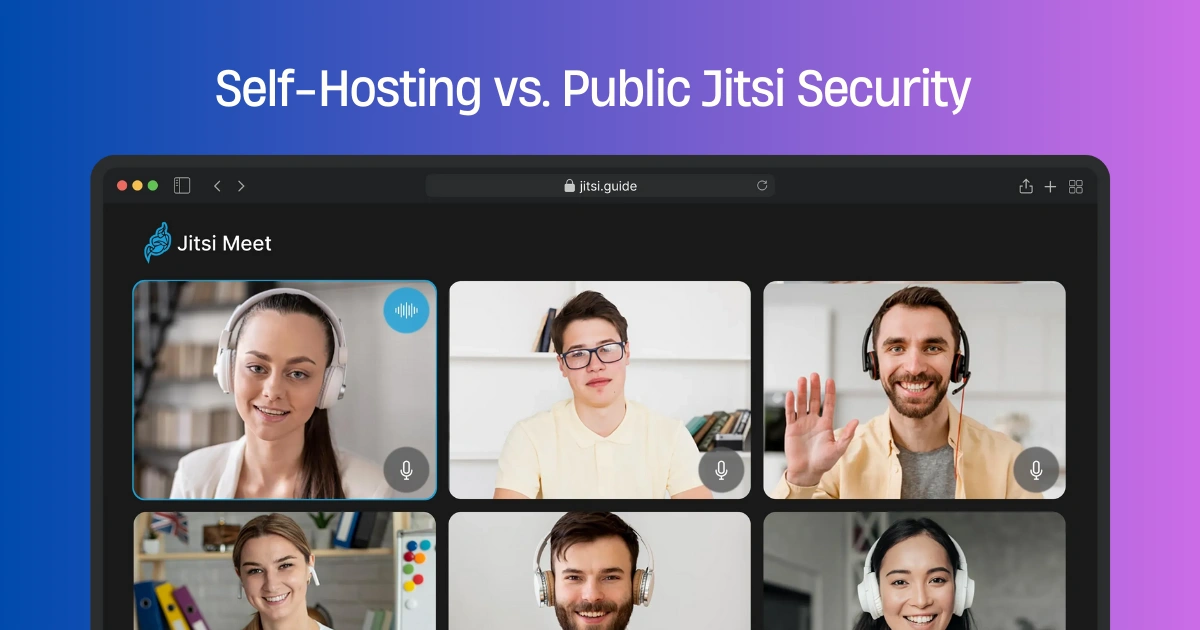Self-Hosting vs. Public Jitsi Security: What’s the Difference?
When people compare Self-Hosting vs. Self-Hosting Jitsi Security, they often want to know which setup gives better protection for online meetings. Jitsi is already a secure, open-source video platform, but the hosting method you choose can make a big difference in privacy, control, and performance. In this guide, we’ll break everything down in simple, human language so you can decide what’s best for your team, business, school, or community.
Understanding Jitsi Security Basics
Before comparing hosting options, it helps to understand how Jitsi protects your calls:
- Strong encryption (DTLS-SRTP)
- Secure Domain for authentication
- No account needed
- Optional end-to-end encryption
- Fully open-source code
Both self-hosted and public servers provide these features. The real difference lies in who controls your data, how protected your environment is, and how much customization you want.
Self-Hosted Jitsi Security: Full Control and Maximum Privacy
What Is Self-Hosted Jitsi?
Self-hosting means running your own Jitsi Meet server on a VPS, cloud infrastructure, or a physical machine. You control everything: updates, configurations, performance, and security.
Security Benefits of Self-Hosted Jitsi
1. Complete Data Control
All meeting data stays within your server. No third parties are involved. This is ideal for:
- Companies with confidential communication
- Government or legal sectors
- Healthcare teams
- Schools or universities
- Internal private communities
2. Custom Security Rules
You can define:
- Password rules
- Authentication methods
- Access restrictions
- Firewall and network rules
- Logging settings
- TLS certificate management
This level of flexibility is not possible on public servers.
3. Secure Domain Authentication
Secure Domain lets only authorized users create meetings. This prevents strangers from starting calls on your server.
4. No Shared Environment
Your server is used only by your organization. This reduces:
- Overload risk
- Performance drops
- Security interference
5. Transparent Monitoring
You can track:
- Logs
- CPU and RAM usage
- Network activity
- Server errors
- Access attempts
This helps detect suspicious activity early.
Security Challenges of Self-Hosting Jitsi
1. Requires Server Skills
You must manage:
- Updates
- SSL renewals
- Security patches
- Firewall settings
- Monitoring
2. Performance Depends on Your Server
Your hardware controls:
- Call quality
- User capacity
- Meeting stability
3. Risk of Misconfiguration
Weak passwords, open ports, or skipped updates can create vulnerabilities.
Public Jitsi Security: Simple, Fast, and Free
What Is Public Jitsi?
Public Jitsi refers to platforms like meet.jit.si, hosted by the Jitsi team. There is:
- No installation
- No server management
- No updates required
Security Benefits of Public Jitsi
1. Managed by Experts
The Jitsi team handles:
- Security patches
- Optimization
- Infrastructure scaling
- Encryption
This ensures stable and secure performance.
2. Quick and Easy
Ideal for:
- Casual meetings
- Student calls
- Temporary discussions
- Quick team syncs
3. Built-in Encryption
Public servers use the same encryption as self-hosted setups.
4. Global Scaling
Public servers handle large loads and protect against attacks like DDoS.
Security Limitations of Public Jitsi
1. Less Data Control
Metadata (not content) goes through servers you don’t control.
2. Shared Server
Multiple users share resources, leading to possible:
- Lag
- Video stutters
- Dropped calls during peak hours
3. No Customization
You cannot add:
- Branding
- Secure Domain
- Custom moderation tools
- Recording integrations
- API customizations
4. E2EE Limitations
Browser support affects E2EE availability.
Self-Hosting vs. Public Jitsi Security: Detailed Comparison
1. Privacy
| Feature | Self-Hosted Jitsi | Public Jitsi |
|---|---|---|
| Meeting Data | Fully controlled | Shared servers |
| Metadata | Controlled by your team | Managed by Jitsi.org |
| Compliance | Can meet strict standards | Not ideal for regulated industries |
2. Security Controls
| Feature | Self-Hosted | Public Jitsi |
|---|---|---|
| Access control | Complete control | Limited |
| Custom security | Full flexibility | Not possible |
| Authentication | Advanced options | Basic options |
3. Ease of Use
| Feature | Self-Hosted | Public Jitsi |
|---|---|---|
| Setup | Requires skills | Instant |
| Maintenance | Needed | None |
4. Performance
| Feature | Self-Hosted | Public Jitsi |
|---|---|---|
| User load | Depends on server | High |
| Stability | Strong with proper setup | Good but shared |
5. Custom Features
Self-hosted allows:
- Branding
- Custom UI
- Jibri recording
- Advanced moderation
- Webhooks
- API-based workflows
Public Jitsi does not support these features.
Which One Should You Choose?
Choose Self-Hosted Jitsi If:
- Privacy is a top priority
- You want full control
- You need branding
- You manage sensitive meetings
- You run an organization or business
Choose Public Jitsi If:
- You want a fast, free option
- You don’t want server management
- You only need occasional meetings
Final Verdict
Both options are secure, but for different reasons. If privacy, control, and long-term stability matter, self-hosting is the best choice. If you want simplicity and instant access, public Jitsi works well.
Your decision depends on how much control you want over your communication environment.
Conclusion
Choosing between Self-Hosting vs. Self-Hosting Jitsi Security comes down to control and privacy. Self-hosted Jitsi offers complete ownership of your meeting environment, while public Jitsi provides simplicity and speed. For businesses, schools, and organizations that value data protection, self-hosting is the stronger option.
If you need help installing, securing, or customizing Jitsi, experts can guide you through every step.
Want help setting up Self-Hosting for your organization? Reach out and I’d be happy to guide you.
